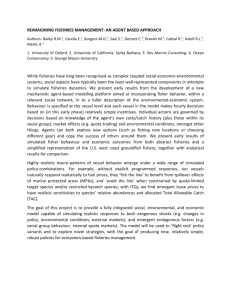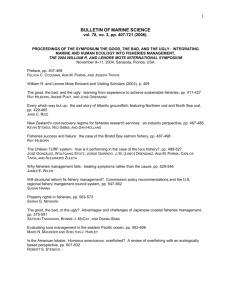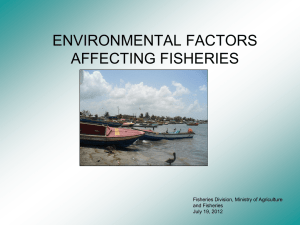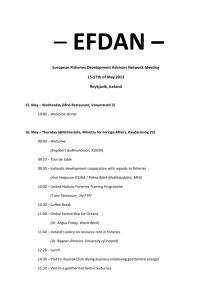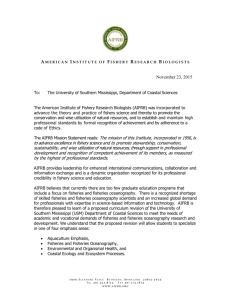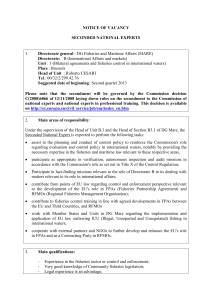Ratana_Book_Proposal
advertisement
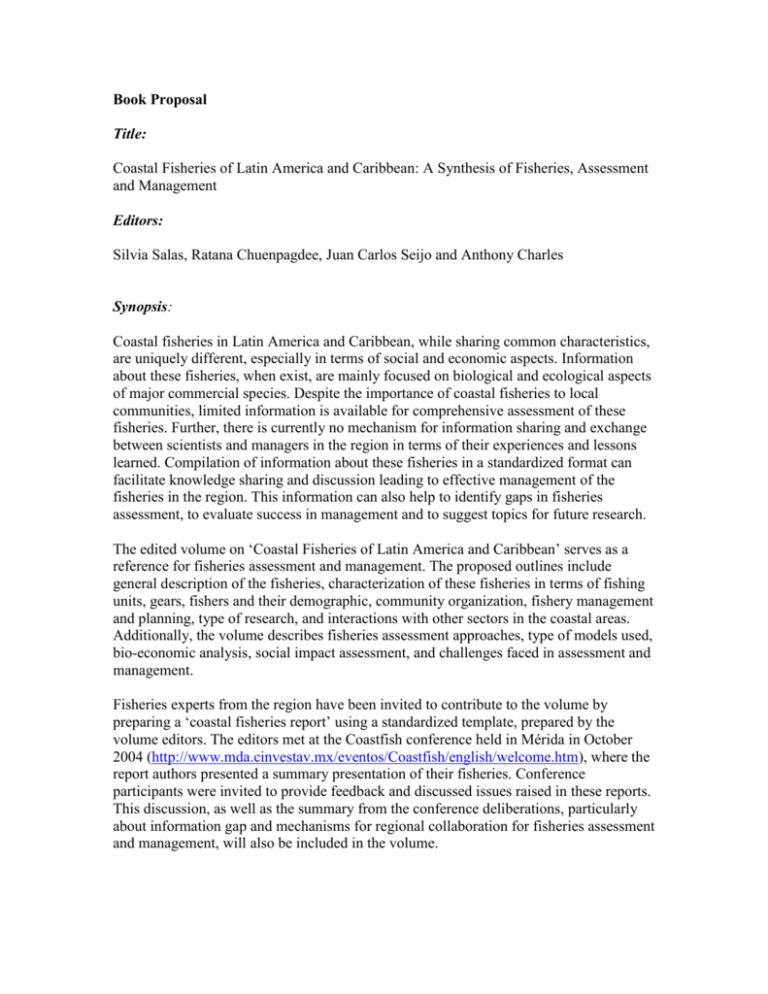
Book Proposal Title: Coastal Fisheries of Latin America and Caribbean: A Synthesis of Fisheries, Assessment and Management Editors: Silvia Salas, Ratana Chuenpagdee, Juan Carlos Seijo and Anthony Charles Synopsis: Coastal fisheries in Latin America and Caribbean, while sharing common characteristics, are uniquely different, especially in terms of social and economic aspects. Information about these fisheries, when exist, are mainly focused on biological and ecological aspects of major commercial species. Despite the importance of coastal fisheries to local communities, limited information is available for comprehensive assessment of these fisheries. Further, there is currently no mechanism for information sharing and exchange between scientists and managers in the region in terms of their experiences and lessons learned. Compilation of information about these fisheries in a standardized format can facilitate knowledge sharing and discussion leading to effective management of the fisheries in the region. This information can also help to identify gaps in fisheries assessment, to evaluate success in management and to suggest topics for future research. The edited volume on ‘Coastal Fisheries of Latin America and Caribbean’ serves as a reference for fisheries assessment and management. The proposed outlines include general description of the fisheries, characterization of these fisheries in terms of fishing units, gears, fishers and their demographic, community organization, fishery management and planning, type of research, and interactions with other sectors in the coastal areas. Additionally, the volume describes fisheries assessment approaches, type of models used, bio-economic analysis, social impact assessment, and challenges faced in assessment and management. Fisheries experts from the region have been invited to contribute to the volume by preparing a ‘coastal fisheries report’ using a standardized template, prepared by the volume editors. The editors met at the Coastfish conference held in Mérida in October 2004 (http://www.mda.cinvestav.mx/eventos/Coastfish/english/welcome.htm), where the report authors presented a summary presentation of their fisheries. Conference participants were invited to provide feedback and discussed issues raised in these reports. This discussion, as well as the summary from the conference deliberations, particularly about information gap and mechanisms for regional collaboration for fisheries assessment and management, will also be included in the volume. Contributors: Currently there are 13 contributions from the following countries: Argentina, Barbados, Brazil, Colombia, Costa Rica, Cuba, Dominican Republic, Grenada, Mexico*, Nicaragua, Puerto Rico, Trinidad and Tobago. Most of these reports are multi-authored (see list below). About half of them are written in English, while the rest is in Spanish. Provided that funding is available, the volume will include reports that are translated into both languages. Note that other countries have shown interests in contributing reports, i.e, Guatemala, Jamaica, Chile, Ecuador, Venezuela, Uruguay and Martinica. A second volume to include these countries might be possible in the future. The 13 reports have been revised based on comments and discussion at CoastFish, and those of the volume editors. The timeline for the completion of this volume is presented below. Target audience and potential benefits: The proposed book volume is a unique compilation of information about coastal fisheries in Latin America and Caribbean. It focuses on current methods in assessing and managing these fisheries, as well as challenges faced in the implementation. The emphasis on coastal fisheries addresses the needs for tools applicable for small-scale, coastal, multi-species fisheries, and for economic, social and cultural importance of these fisheries to coastal communities. The book is suitable for fisheries managers, policymakers, researchers, students, non government organizations, and environmental groups interested in coastal fisheries issues in Latin America and Caribbean. Contents: Foreword by Professor Daniel Pauly Part I: Coastal Fisheries Reports: Current Knowledge and Status This part contains 13 fisheries reports, each with the following sections: - Description of the fishery - Fishing activities - Characteristics of fishers - Social and economic aspects - Fishery management and planning - Community organization - Research, information and education - Interactions among fishers, and with other sectors - Assessment methods (stock assessment, ecological, bio-economic and social) * Mexico fisheries are divided into two reports: one for the Pacific and one for the Gulf of Mexico and the Caribbean. Part 2: Assessment and Management of Coastal Fisheries: Issues and Challenges This part contains a synthesis of assessment and management of coastal fisheries in the region, based the reports and the discussion at CoastFish. Three chapters are planned for this part, as follows: 1. Current tools and their applicability Summary of existing tools used in assessment of coastal fisheries, analysis of their strengths, weaknesses and their applicability, and problems faced in their applications. 2. Issues and challenges in coastal fisheries assessment and management Summary and comparison of issues faced in assessment and management of coastal fisheries, by type of fisheries (e.g., pelagic, demersal, benthic invertebrates) and by assessment tools (e.g., biological, social, economic 3. Regional collaboration, partnership and capacity building Discussion about database and data sharing mechanisms, how to strengthen regional collaboration and build partnership with others outside the region, and how to increase local capacity for assessment and management of coastal fisheries. Part 3: Ways forward - A concluding chapter summarizing main points and recommendations. Appendix: Toolbox for Coastal Fisheries Assessment and Management An appendix of ‘toolbox’ will be provided as a reference, which will contain information about type of fisheries each tool is suitable for, data requirements, potential problems in application, suggested solutions, and examples of uses. Authors Index Subject Index Timeline: Oct-Nov 2005: Dec 2006: Feb-Mar 2006: Apr 2006: May 2006: Editors review Revision by authors External review Final revision Submit complete manuscript to publisher Editors’ profile: Dr. Silvia Salas is associated professor at Cinvestav (Research centre in Yucatan Mexico). She has worked on bioeconomic analysis of lobster fisheries in Canada and Mexico, fishing strategies of small-scale fishers in Mexico, decision analysis of salmon fisheries in Canada and has been involved in several projects working with indigenous people in Canada and Mexico. She also works as a consultant for the National Commission of Fisheries in Mexico and the main Oil company in Mexico (Pemex) looking at different type of impacts of anthropogenic activities on fisheries. Her current research involves: bioeconomic analysis of small-scale fisheries, evaluation of fishing strategies of fishers, dynamics of the fleet and implications for management, evaluation of perception of use and management of coastal resources. She has given different courses on fisheries biology and fisheries bioeconomics in Mexico. Dr. Ratana Chuenpagdee is co-director of Coastal Development Centre, in Bangkok, and senior research fellow at International Ocean Institute - Canada, in Halifax, Nova Scotia. She specializes in interdisciplinary approaches to fisheries and coastal ecosystems management, focusing particularly on small-scale fisheries, marine protected areas, community-based management, food security and fisheries governance. Dr. Chuenpagdee developed the ‘damage schedule approach’ for natural resource management and has applied it in various settings, including Belize, Canada, Mexico, Thailand and US. She has recently completed a multi-authored handbook called ‘Interactive Fisheries Governance: A Guide to Better Practice’, as part of an EU-funded project. Dr. Chuenpagdee is a work-package leader for the new EU-funded project on ‘Integrating Multiple Demands on Coastal Zones with Emphasis on Fisheries and Aquatic Ecosystems.’ Dr. Juan Carlos Seijo is a professor at Universidad Marista in Yucatán, México. He has worked as FAO-ONU adviser at the WECAFC region for more than 15 years and he is currently the President of the scientific board of the fisheries commission for the WECAFC and is a member of the National Academy of Science in Mexico. He has given diverse number of courses organised by ONU, DANIDA associated to fisheries and specialized courses on fisheries bioeconomics and modelling in different countries in Latin America. Dr. Seijo’s work includes bioeconomic analysis of aquacultural systems. He works collaboratively with scientists from different institutes such as the University of Stirling, Scotland, Ocean University in Taiwan, University of Delaware and others. Dr. Anthony Charles is a professor of Management Science and Environmental Studies at Saint Mary’s University, in Halifax, Canada, where he focuses on interdisciplinary research in fisheries and coastal management. He has a longstanding interest and involvement in fishery, aquaculture and coastal projects in developing regions, notably Asia, Latin America and the Caribbean. Tony’s work ranges from fishery policy analysis, to socioeconomic studies, to bioeconomic modelling of fishery and aquaculture systems. Current research interests include community-based fishery management, integrated fishery and marine indicators, and analysis of sustainability issues in fisheries. Tony is the author or co-author of a range of publications, including the books Sustainable Fishery Systems (Blackwell Science), Integrated Fish Farming (CRC Lewis), and Canadian Marine Fisheries in a Changing and Uncertain World (NRC Press). Tony chaired the Canadian Fisheries Resource Conservation Council Committee; he is member of the Ocean Management Research Network, a Canadian body promoting and coordinating research on ocean uses and management and works with community fishery organizations and First Nations in Atlantic Canada, and with international bodies such as the FAO and OECD. In 2001, Tony was awarded a Pew Fellowship in Marine Conservation. List of contributors: Argentina: Inés Elías, Claudia Carozza, Edgardo E. Di Giácomo, Miguel S. Isla, José (Lobo) Orensanz, Ana María Parma, Raúl C. Pereiro, M. Raquel Perier, Ricardo G. Perrotta, María E. Ré and Claudio Ruarte Barbados: Patrick McConney Brazil: Antonio Carlos Diegues, Marcelo Vasconcellos and Daniela Coswig Kalikoski Colombia: Mario Rueda, Jacobo Blanco, Juan Carlos Narváez and Efrain Viloria Costa Rica: Angel Herrera-Ulloa and Guillermo Oro-Marcos Cuba: Servando V. Valle Dominica Republic: Alejandro Herrera, Liliana Betancourt, Miguel Silva, Patricia Lamelas and Alba Melo Grenada: Roland Baldeo Mexico: Francisco Arreguin Sanchez and Antonio D. Leon Nicaragua: Iris Monnereau Puerto Rico: Mónica Valle-Esquivel, Daniel Matos-Caraballo, Manoj Shivlani, Manuel Valdéz-Pizzini, David J. Die and Graciela García Moliner Trinidad and Tobago: Elizabeth Mohammed, Lara Ferreira, Suzuette Soomai, Louanna Martin and Christine Chan A Shing



